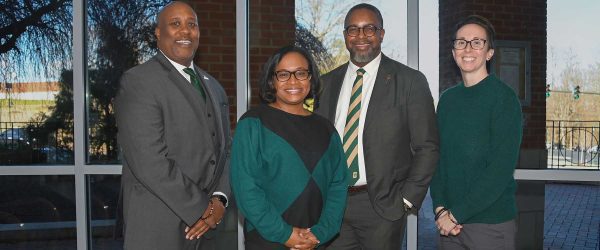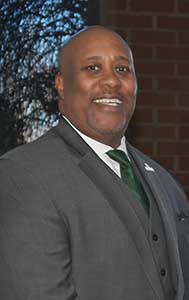An all-campus approach to student mental health services

Traditionally, university counseling centers shoulder the bulk of student mental health support services. However, at UNC Charlotte, where the student population exceeds 30,000, the approach to mental health care extends campuswide.
For leaders in student mental health services at Charlotte, this philosophy isn’t just theoretical; it’s ingrained in their practices. Guided by student input, data-driven insights into student needs and a commitment to providing prompt access to care — offering same-day initial appointments—the university has adopted a proactive stance where outreach and prevention efforts are integral to fostering positive student mental health outcomes. Among its many initiatives is the creation of its newest student health department, the Center for Integrated Care, a “one-stop shop” for student wellness needs.
Here, Charlotte’s Division of Student Affairs-led mental health services leadership team outlines its approach, successes and ongoing challenges.
UNC Charlotte’s campuswide approach to delivering student mental health services is led by Kevin Bailey, Ph.D., vice chancellor for student affairs; Leigh Norwood, MSW, LCSW, director, Center for Integrated Care; Christopher Smith, MPH, associate vice chancellor for student affairs; and Erica Lennon, Psy.D., director, Center for Counseling and Psychological Services.
What drives UNC Charlotte’s approach to delivering mental health services to students?
 Kevin Bailey: Overall, our team’s goal is to be preventive and proactive — while meeting students where they are. At UNC Charlotte, our approach to delivering mental health services has widened, the result of committing to prevention in each of five departments: the Center for Counseling and Psychological Services, the Center for Integrated Care, the Center for Wellness Promotion, Student Health and University Recreation. There also is a concentrated effort to provide nationally recognized training and public education programs — led by staff within Counseling and Psychological Services as well as from outside of CAPS — such as Mental Health First Aid and Question, Persuade, Refer to faculty, staff and students. During the 2022-23 academic year, 632 campus community members took advantage of these sessions.
Kevin Bailey: Overall, our team’s goal is to be preventive and proactive — while meeting students where they are. At UNC Charlotte, our approach to delivering mental health services has widened, the result of committing to prevention in each of five departments: the Center for Counseling and Psychological Services, the Center for Integrated Care, the Center for Wellness Promotion, Student Health and University Recreation. There also is a concentrated effort to provide nationally recognized training and public education programs — led by staff within Counseling and Psychological Services as well as from outside of CAPS — such as Mental Health First Aid and Question, Persuade, Refer to faculty, staff and students. During the 2022-23 academic year, 632 campus community members took advantage of these sessions.
Chris Smith: Because multiple factors contribute to mental health challenges and opportunities for student well-being coexist within every space of the University ecosystem, our aim is to empower students to seek support through their most comfortable spaces or wherever a spontaneous need arises. A strategically layered system removes connection barriers through shared responsibility to directly bridge students to assistance in a timely manner.
Support from the UNC System is interwoven into a strategic ‘prevention and response’ approach. Opportunity to better understand these resources through actual use on campus amplifies our ability to tailor our model of student care with intentionality, acknowledging UNC Charlotte nuances and the unique needs of our student population.
How does the Center for Counseling and Psychological Services prioritize meeting student needs?
Erica Lennon: Over the past year, CAPS piloted and implemented a ‘personalized care model’ that extends beyond individual counseling as a primary form of support, offering an expansive list of services within CAPS as well as through other campus and community services. An important part of this philosophy is the notion that campus and community-based outreach and prevention services are paramount to a healthy student community. These include groups, workshops, drop-in problem-solving consultation sessions, self-paced educational materials, outreach programs and individual counseling. We also are exploring peer support as a service.
Why are same-day appointments important – and how does Charlotte’s intake process accommodate all who need care immediately?
 Erica Lennon: Same-day initial appointments — a critical aspect of our approach — enhance the accessibility of timely care and position us to address a situation before it worsens. If too much time passes between a student making an initial appointment and being seen, their symptoms are likely to intensify — and something that was not a crisis initially may become one.
Erica Lennon: Same-day initial appointments — a critical aspect of our approach — enhance the accessibility of timely care and position us to address a situation before it worsens. If too much time passes between a student making an initial appointment and being seen, their symptoms are likely to intensify — and something that was not a crisis initially may become one.
Access teams composed of counselors are available Monday through Thursday for morning and afternoon appointments to meet with students requesting a first appointment on a first-come, first-served basis — for both assessment and recommendations for moving forward. On Fridays, a smaller group of counselors provide same-day appointments for urgent or crisis-related needs.
Between fall 2022 and fall 2023, the average wait time for an initial appointment decreased dramatically from eight days to zero. The reduced wait time led to a significant increase in students keeping their initial appointments — from 64% to 98%. This gives our staff an opportunity to help students create a collaborative plan to address their mental health.
Explain the Center for Integrated Care’s “one-stop shop” approach for connecting students to resources – on and off campus.
 Leigh Norwood: The Center for Integrated Care bridges the gaps that exist naturally between UNC Charlotte’s various health resources and serves as a source of connection and referral for students who may need resources beyond those provided by the campus community. For example, a student may need specialized services not offered by CAPS. The one-stop shop concept refers to assessment and triage of a student’s psychosocial functioning, the streamlining of services and increased student utilization of on- and/or off-campus resources, all in support of holistic wellness and academic persistence. This paradigm of bridging services refers to the consistent and open communication for all providers involved in a student’s health and wellness care plan via the provision of clinical case management.
Leigh Norwood: The Center for Integrated Care bridges the gaps that exist naturally between UNC Charlotte’s various health resources and serves as a source of connection and referral for students who may need resources beyond those provided by the campus community. For example, a student may need specialized services not offered by CAPS. The one-stop shop concept refers to assessment and triage of a student’s psychosocial functioning, the streamlining of services and increased student utilization of on- and/or off-campus resources, all in support of holistic wellness and academic persistence. This paradigm of bridging services refers to the consistent and open communication for all providers involved in a student’s health and wellness care plan via the provision of clinical case management.
During our first academic year, CIC served 277 students needing assistance identifying barriers to their success, specifically as they were precipitated or impacted by their physical and emotional well-being. CIC staff engage students in conversations (and subsequent biopsychosocial assessments) to help them identify and prioritize their needs, which guides recommendations and referrals for specific resources and eliminates the need for students to coordinate information from multiple offices to initiate care.
How do the needs of students who utilize CIC differ from those who are served by CAPS?
Leigh Norwood: CAPS serves students who have self-identified as having emotional and/or mental health concerns. CIC provides students an opportunity to explore their concerns holistically and connect them to resources that help them achieve wellness in that area. CIC is well-positioned to support students with complex, intersecting needs across life domains; we help students navigate their myriad concerns to ‘sort through the chaos’ and find optimal points of intervention. With an emphasis on health equity, the CIC examines potential disparities and gaps through outreach programming, taskforce initiatives and the evaluation of data obtained from all health and wellbeing departments.
What other services and entry points to mental health services are available for Charlotte students?
 Christopher Smith: Group therapy sessions for six to eight students are helpful for several reasons. They allow more students to access talk therapy than is possible with individual sessions. They also help participating students see they are not alone in their feelings; and group members tend to help one another.
Christopher Smith: Group therapy sessions for six to eight students are helpful for several reasons. They allow more students to access talk therapy than is possible with individual sessions. They also help participating students see they are not alone in their feelings; and group members tend to help one another.
In addition, access to 24/7-available resources and services that support mental health exist to provide continuous support from professional staff and student peers. These include Togetherall, accessed by a downloadable app, which creates a safe and monitored community of student peers who are seeking and sharing support. ProtoCall, an after-hours phone service, empowers students with around-the-clock access to licensed clinicians working with CAPS to support them through acute or urgent mental health needs. In light of the post-pandemic digital burnout experienced by many students, digital resources must be integrated into an existing campus student care strategy so they serve as a benefit rather than become a source of anxiety.
University Recreation is an essential pillar of the integrated student well-being model. Through UREC, students gain access to peers with similar interests, which enhances a sense of belonging. Students also reap the benefits of physical activity, which aids the body’s innate tendency for resilience and proactively mitigate stress.
What lessons from UNC Charlotte’s experience are readily applicable to mental health services teams at other institutions?
Kevin Bailey: We hear often that colleges and universities cannot buy their way out of the mental health crisis. For this reason, hiring more counselors is not the answer. Institutions must be strategic in deploying the resources they have and educating students on steps they can take — for example, increasing mindfulness and reducing social media use — to manage their mental health. Group counseling, a unit to triage student mental health issues, apps like Togetherall and employee trainings like Mental Health First Aid provide wrap-around services to care for the needs of students. It is not one thing, but a series of things that weave a web of support for students.
Overall, UNC Charlotte is privileged to be a resource rich campus community. To learn more about campus programs and resources, we encourage students and families to access the Health and Wellbeing website and Niner Engage.